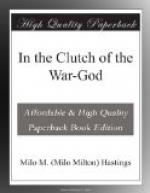The Regenerationist, now removed to St. Louis, was again a full-sized newspaper. The party in power, supported by the capitalistic and military classes, preached old-fashioned patriotism and with martial music and flying flags tried to enthuse the people. But the terror of the American soldiery in the unfair battle of Beaumont had gone abroad throughout the land. The people feared the draft for military service—they feared the firing of the cities—the poisoning of their water supplies and a hundred other spectres which in the minds of a degenerate and servile city population the presence of a successful aerial enemy had inspired.
The reform party of the Regenerationists had by the fortunes of war achieved a tremendous growth. Their recruits came both from the better element who had thus been awakened from their lethargy, and from the cowardly rabble who supported peace because of the terror in their hearts.
Gerald Stoddard, Chancellor of the University of Illinois, a big sound man of clean mind and clean body, was chosen as the radical presidential candidate, and won with an overwhelming majority.
His election meant peace between the warring powers, and strong likelihood of peace in the world for all time to come. It also meant other things. It meant the complete inversion of the American policy and the welcoming of science as the servant of mankind’s larger needs and not merely a flunky to the degenerate, luxury-loving few.
President-elect Stoddard, with masterful hand, began at once the organization of the new administration. Among the appointees whom he early announced was that of Stanley Winslow, to the position of Secretary of Public Health.
In his telegram of acceptance, Winslow said:
“In signifying my intention of accepting the position of Secretary of Public Health in your Cabinet, I wish to say that it will be my sole purpose to prove myself possessed of the larger patriotism which would defend our race against retrogression and annihilation, not by such antiquated and inefficient methods as immigration restriction or mechanical warfare, but by the improvement of the race itself.”
And Ethel, too, sent a telegram. It read:
Professor and Madame Oshima,
Japanese occupation,
south
Dakota.
As soon as travel is freely established come and visit us. When are the children coming over?
Ethel Calvert Winslow,
Care
the Regenerationist.
St. Louis, Mo.
But of Komoru she said not a word. She couldn’t forget the unfathomable look in his eyes. At times she even argued with herself that the poor fellow had loved her, but had feared to express himself because he believed (as he had stated in his scientific essays) that inter-racial marriages were uneugenic and hence immoral.




